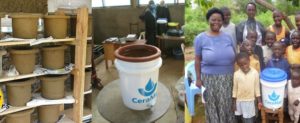A while back an article in The Guardian posed the question – ‘Is “sustainability” going the way of “eco” and “green”?’ The newspaper spurred its readers to tweet and poll on ‘#sustywords’ that invoke eye-rolling, and ‘sustainability’ was grouped with banal words like ‘green’, ‘eco-efficiency’, ‘renewable’ and ‘ecochic.’ For this blog post when I searched the phrase ‘sustainability cliché’, Google offered a staggering number of results. Top hits included media outlets’ maxims on overused marketing buzzwords (like ‘sustainable’ or ‘green’), an academic article on ‘reclaiming the concept of sustainability’ bemoaning the linguistic devaluation of the word ‘sustainable’ in environmental education, and endless suggestions to articles/blog posts (much like this one) debating why or why not the word has indeed become a cliché. Clearly we are not the only ones in office wondering how often we should use the ‘S’ word while talking about our initiatives like the Empowering Women Period project. In the light of what’s said above, we think that our usage of ‘sustainability’ when describing our own work with international partners certainly warrants an explanation.
For Village Volunteers, a sustainable project looks like this – people of a community identify the problem they’re facing; they identify a locally acceptable solution to the problem; we provide funding/training for a locally operated program/facility that will gainfully employ/engage members of the community while dealing with the problem. The model of problem solving should be such that people of a community can meet their own needs and becomes self sufficient once initial training/equipment/know-how has been provided.
Here is an example: we were aware of the acute problem of availability of potable water in certain parts of Kenya. Local leaders recognized that it would be easier for families to treat water in their own households with affordable and portable equipment (like water filters), than to work/bargain with the authorities for the provision of clean water. To meet this solution, Village Volunteers partnered with Innovative Canadians for Change and Potters Without Borders to develop a low-cost water filter manufacturing plant where the filters would be made by the people, using locally available materials. And the result of this partnership was the establishment of the ceramic water filter manufacturing plant in Kiminini, Kenya, at our partner Common Ground for Africa’s site. Today the plant has the capacity to produce 10-12,000 water filters per year that eliminate 99.8% of waterborne pathogens. For us, the solution does not lie in isolating the problem and providing a one-time solution in the shape of aid (in this case one could perhaps rephrase the problem dramatically as – “You don’t have clean water to drink? Why don’t we ship you a case of Crystal Springs!”).
That brings us to our upcoming project – the water hyacinth sanitary pad project. This biodegradable sanitary pad will be made at a manufacturing facility owned and operated by women from New Light, Kolkata who will secure a salary and health insurance. The product will be made out of Earth-conscious materials like the terribly invasive and locally abundant aquatic weed that is water hyacinth, and crustacean shell-based “Green Film” plastic that can decompose in a pit latrine. The pad will be distributed woman-to-women through direct outreach programs, and via a matching program to at-risk girls in school. It’s surprising then that feminine hygiene products like menstrual cups, distributed in east Africa get such huge press. In the areas we work, it is a strict cultural taboo for girls to insert something inside of them, especially virgins. Also, without access to clean running water to wash hands, or fuel or privacy to sanitize these cups, it’s hard to conceive how girls in villages are expected to manage menstrual cups or cloth pads in a hygienic way. If we in the ‘first world’ think twice about using reusable cloth pads during periods (and that’s despite easy access to safe water, private bathrooms and laundry rooms), why is it alright to offer reusable products to women in poor communities? Also, while we could ship containers of sanitary pads (cloth or otherwise) or cups to those in need, we would not only add to their garbage problem, but would be diluting an opportunity for local employment and empowerment – the solution hardly lies in adding international aid dependence to the mix. And so we’re working hard with on-the-ground partners New Light and Aakar Innovations to setup a manufacturing plant in Kolkata that will provide employment to some, and biodegradable+safe menstrual care to many. Our goal is to replicate this project all over the world and Kenya is next.
Our support of local enterprises, locally conceptualized solutions and local empowerment is resolute. And such is our commitment to sustainability.

